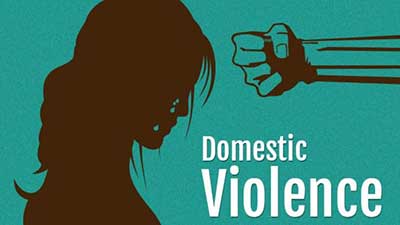Date: 30/11/2022
Relevance: GS-2: Laws, Institutions, and Bodies constituted for the Protection and Betterment of these Vulnerable Sections.
Key Phrases: International Day for Elimination of All Forms of Violence against Women, Protection of Women from Domestic Violence Act 2005 (PWDVA), National Family Health Survey-5, financial insecurity, protection officers, new skills, and livelihood opportunities.
Why in News?
- On the International Day for Elimination of All Forms of Violence against Women (November 25), the brutal murder and mutilation of a young woman by her partner has drawn attention to intimate partner violence, also recognized under the Protection of Women from Domestic Violence Act 2005 (PWDVA) as a kind of domestic violence.
Domestic violence in India:
- National Family Health Survey-5 (2019-21):
- 32% of ever-married women aged 18-49 years have ever experienced emotional, physical, or sexual violence committed by their husbands, with more rural than urban women reporting experiences of domestic violence. This does not even capture the prevalence of violence by other family members too.
- Seeking help:
- The NFHS- 5 reports that only 14% of women who have experienced domestic violence have ever sought help, and this number is much lower in rural areas.
- Justification of violence:
- So ingrained are social norms about gender inequality that NFHS-5 data reports that women are more likely than men to justify a scenario in which it is acceptable for a husband to beat or hit his wife.
Challenges faced during seeking help:
- Hopefulness:
- Many times, women are hopeful that things would change, that they could change their husband’s behaviour, and that he would listen to them.
- Burden:
- They do not want to be a ‘burden’ on others, in particular their families.
- Source of tension:
- By naming the violence they experienced, women believe that they would become ‘a problem’ or a source of ‘tension’ for their families, bringing them shame and dishonour, irrespective of the survivor’s level of education, caste, or class.
- Individual responsibility:
- For migrant women, trans people, or those with several sisters, or ill, older or deceased parents, it is felt even more acutely that the perpetrator’s violence was their individual responsibility to manage.
When it comes to help-seeking, it is found that two main groups of women —
- Survivors shared experiences of violence within six months:
- They mainly turned to their parents who, in a majority of cases, insisted on their daughter preserving the family environment which they should do by ‘adjusting’ to, or accommodating their husband’s (and his family’s) needs better.
- In a minority of cases, the daughter’s welfare was prioritized over the well-being of the ‘the family’, and steps were taken to help mediate or exit the relationship, and much more infrequently approach the police and lawyers.
- Survivors who shared after five years or more:
- For survivors who took longer to seek help, the actions of relatives or neighbours who witnessed the violence were often pivotal in transforming their situations.
- So were key ‘turning’ or ‘tipping’ points such as a survivor’s heightened concerns for their children’s safety, the discovery of a husband’s affair, or when violence became “too much” and required medical assistance.
- Waiting until such a point before seeking help was more likely for survivors who struggled to imagine exiting a relationship due to financial insecurity and/or patriarchal norms concerning property ownership.
Economic self-sufficiency:
- With few safe houses across India, the simple reality was that many women have nowhere else to go, and access to legal justice through the courts was a material possibility only for women with independent wealth and connections or those supported by specialist non-governmental organizations.
- So, for many survivors, transforming their situation depended on securing their economic self-sufficiency by pursuing new skills and livelihood opportunities.
Role of the police:
- Women who reported experiences of violence to the police were cynical about the outcome.
- Though a small minority had positive experiences, for the majority of women, the police were part of the problem rather than a solution to violence.
- Across the States, it is heard that the police were more likely to send women back to violent households to reconcile with the perpetrator or use violence against perpetrators as a deterrent instead of filing an official complaint or connecting women to protection officers and other service providers, as the PWDVA outlines they should.
- Several States are yet to implement Protection officers and where they are in post, they are under-resourced, under-skilled, and overworked, making their remit impossible.
Way forward:
- Over 17 years ago the PWDVA, a progressive legislation, was passed, promising a joined-up approach — involving civil and criminal protections — to support and protect women from violence within the household, not just from husbands.
- But despite the law existing on paper, women are still largely unable to access the law in practice.
- Its promise and provisions are unevenly implemented, unavailable and out of reach for most Indian women.
- There is a need for uniform and stringent implementation of the Domestic Violence Act, along with sensitization of the police force.
- The survivors of domestic violence must be provided with shelter, safety, and free legal aid with the help of NGOs and civil society organizations so that it can instil confidence among the women to come out and fight against the violence occurring in the domestic sphere.
- To stop women from having to shoulder the weight of domestic abuse for too long, states must aim to provide financial independence to women through easing access to capital, education, health, skills, and other services.
- Only in a world where women can enjoy their human rights de jure and de facto will domestic violence belong to the past.
Source: The Hindu
Mains Question:
Q. What are the challenges faced by women seeking help during domestic violence in India? Suggest some measures to improve the situation.






















